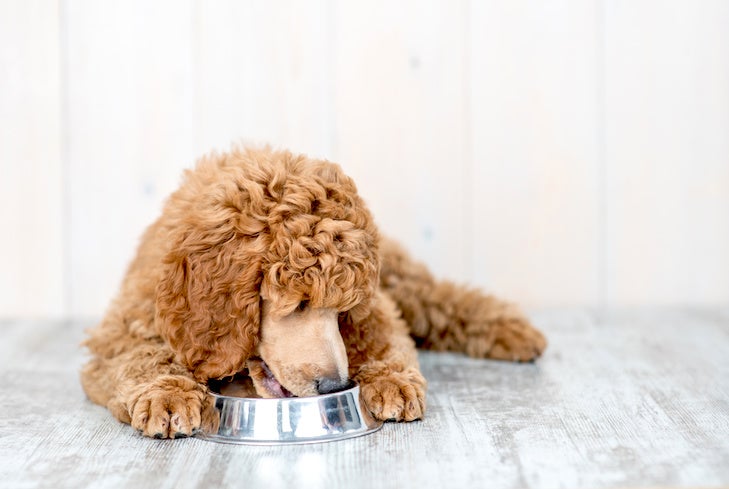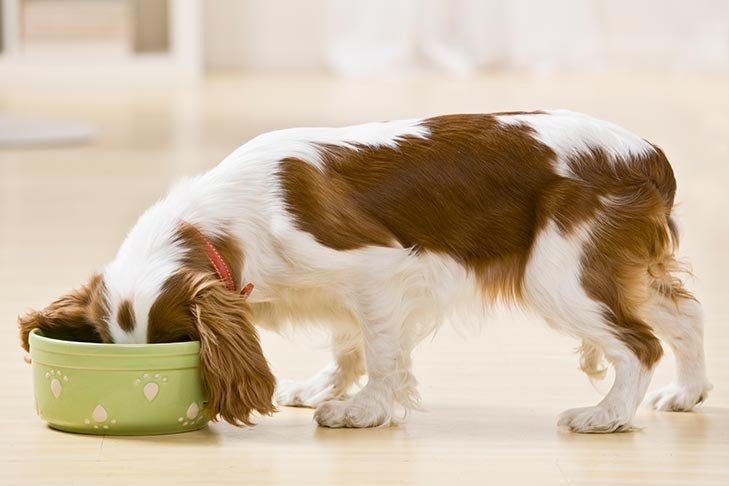The Internet can offer a wealth of tips and facts on dog food. Unfortunately, it provides even more dog food myths and misinformation. Here’s a sampling of urban legends populating the Web and the actual truths behind them.
Myth: Don’t Feed Dogs Pork
But then I started to wonder why so few commercial foods contained pork. Some rumors include suggestions that pork’s high fat content will cause pancreatitis in dogs (yet pork contains a little over one-third the fat content of beef), that it contains something toxic to dogs’ livers (a mystery component), that pigs eat disgusting things including bugs (but it’s fine for people to eat them), and that pig meat is hard to come by (harder than bison?).
A few dog food companies do offer pork-based foods. Its scarcity may simply be because so many parts of a pig are used for human consumption that snouts and feet and such don’t make it to the dog food plant. And because of the possibility of trichinosis in uncooked pork, nobody is going to suggest it as a great raw-food ingredient.
According to Eagle Pack staff veterinarian Al Townshend, DVM, “Pork is a highly digestible animal protein, an excellent source of amino acids, and a unique protein source that not all pets are typically exposed to. It’s less likely to cause an allergic reaction that some pets may have to other proteins. We recommend pork as a protein because it contains more calories per pound.”
Myth: Lamb Is Hypoallergenic
There is nothing inherently less allergenic in one meat compared to another. Lamb was initially used in hypoallergenic dog foods because it was a meat most pups had not eaten before; therefore, they were unlikely to have developed food allergies to lamb. Now, with so many people feeding lamb as a regular diet, manufacturers have had to find different meat sources, such as duck or bison.

Myth: High-Protein Diets Cause Kidney Failure
The idea that excess protein causes kidney failure arises from the fact that high levels of protein have historically been ill-advised for dogs with the condition. Failing kidneys allow urea, a byproduct of protein metabolism, to build up in the blood, making the dog feel sick. That’s why the blood urea nitrogen (BUN) is used as one index of kidney function. Decreasing dietary protein can decrease the BUN. But if the protein level is too low, the body simply draws on its own protein source (muscles), causing more harm.
In fact, there’s a huge debate about whether restricted protein is the way to go for dogs with kidney disease, with studies disagreeing about whether it helps kidney patients live longer. Researchers do agree that protein sources with high biological value produce fewer waste products and are better choices. Egg protein has the highest biological value, followed by milk, meats, and more.
But what about protein levels for dogs with normal kidney function? There’s very little support for the suggestion that you can preserve kidney health by not taxing them with too much protein. Feed a moderate level of high-quality protein, and your dog will likely be just fine.
Myth: Meat Is More Nutritious Than Meat Meal
If you’re comparing ingredient lists, should you choose the one with meat or with meat meal listed first? If your goal is to have the most meat nutrients, choose meat meal. Ingredients appear in descending order of their weight; that weight includes any water in the ingredient.
When you see chicken listed as an ingredient, it means unprocessed chicken, complete with water. Chicken meal means chicken with the water and fat removed. It weighs less than chicken but actually can contain a higher percentage of protein.

Myth: Grain, Especially Soy or Corn, Is Bad for Dogs
Some dogs can be allergic to some grains, just as some dogs can be allergic to some meats. But for most dogs, some grain is fine; it usually contains more nutrients than replacement ingredients used in grain-free diets. Also be aware that the FDA is investigating potential links between grain-free diets and heart disease in dogs.
Myth: Feed Raw Eggs for a Shiny Coat
I have never found one study showing this to be true. Eggs contain lots of protein, fat, and vitamins, all essential to hair growth and skin health. One of those vitamins is biotin, which is important for cell growth and fatty-acid metabolism. Biotin is widely accepted to be helpful for human hair, though that may be simply because deficiencies can cause hair loss. While egg whites contain avidin, a biotin inhibitor, the yolks contain enough biotin to make up for it. But diets high in fat have been shown to result in glossier and softer coats in dogs, and might do the coat more good than eggs.
As for feeding them raw eggs, it’s true that cooking will do away with the avidin, but some people feel that also destroys vitamins. And of course, the raw egg/salmonella debate rages, with most food authorities cautioning against feeding eggs raw and many dog naturalists advocating it.
The bottom line is an egg is a good source of protein and other nutrients, but probably no better than any good diet at promoting a shiny coat.
Myth: Dogs Don’t Like Variety
Dogs raised on a non-varied diet prefer to stay on it and don’t accept new foods readily. But dogs raised on a varied diet prefer variety. From a nutritional standpoint, it makes sense for an animal to crave nutrients its current diet lacks.
Myth: Raw Food Is Better for Dogs
While raw food may be suitable for some pups, it isn’t for all dogs. A recent study in the United Kingdom examined the presence of antibacterial-resistant (ABR) E. Coli in 16-week-old dogs who ate raw food. The scientists concluded that raw feeding is associated with carriage of ABR E. coli in dogs even at 16 weeks of age and that bacteria carried by puppies are shared with humans. We therefore suggest that those who feed their dogs raw meat seriously consider the potential ABR-transmission threat their pet may become as a result and deploy appropriate hygiene practices in mitigation.” While ABR-resistant E. Coli might be present in some raw food, most healthy dogs won’t get sick from it.
While the Internet can be a great source of information, remember to use always look for trustworthy sources and seek scientific research backing up any claims your social media friends may be making before hitting that share button.
 This article originally appeared in the award-winning AKC Family Dog magazine. Subscribe today!
This article originally appeared in the award-winning AKC Family Dog magazine. Subscribe today!

